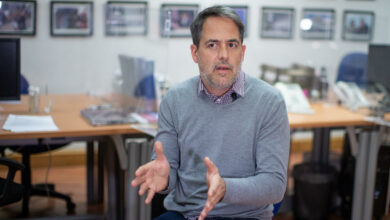True son of the soil poised to become Peru’s president

By Carla Samon Ross
Tacabamba, Peru, Jun 5 (EFE).- Decades ago, illiterate peasant Ireño Castillo would have scoffed at anyone who tried to tell him that the third of the nine children he raised with wife Mavilla Terrones would one day be a candidate for president of Peru, let alone the favorite.
But polls show 51-year-old schoolteacher Pedro Castillo with a slight lead over Keiko Fujimori, the daughter of a former president, on the eve of Sunday’s runoff election.
Ireño, 81, and Mavilla, 75, spent most of their lives struggling to get by as tenant farmers on a hacienda in the village of San Luis de Puña, where they still live in a modest home of stone and adobe with a roof of corrugated iron.
“I was a poor boy and I didn’t have enough money to pay the rent (for the land) and educate my children,” he told Efe.
But Ireño was able to share with Pedro the values of his Catholic faith, a sense of civic responsibility in the form of service with the peasant militias and the discipline of hard work.
When Pedro was 12, Ireño began taking him on an annual expedition to a coffee plantation in the Peruvian Amazon, where they spent a month as day laborers during the harvest.
Father and son made the 140 km (87 mi) journey on foot.
“We went with cold meat and two or three days on the path, with knapsacks over our shoulders,” Ireño recounted. “And we brought back a little money to buy his notebooks and school uniform.”
The future presidential candidate endured an arduous regimen to pursue his studies while continuing to contribute to the household.
“The day he didn’t have classes, (Pedro) worked all day on the land, cultivating maize and potatoes and watching the cattle,” oldest brother Jose Mercedes Castillo told Efe.
“We had food because all of us, from the time we were children, worked as if we had been adults,” the 55-year-old says outside the home he built with his own hands just a few meters (yards) from his parents’ house.
During his school days, Pedro left every day at 5:00 am to trudge two hours through mud, wearing a poncho and the large straw hat typical of Chota – which has become his trademark – as protection from the elements.
“He never faltered,” his father said.
The discipline and ability to bear hardships he acquired as a youth turned out to be the perfect training for a career as a rural schoolteacher.
Over the last 25 years, Pedro Castillo has taught in three different remote villages in his native northern region of Cajamarca, where more than 60 percent of the population is below the poverty line.
Though the pay is low, a teacher in rural Peru occupies a position on influence and respect in the community and filling that role prepared Castillo to become active in his union.
By 2017, his profile had grown to the point where he could emerge as the leader and spokesperson of a months-long teachers strike that became caught up in the political battle between Keiko Fujimori’s party and then-President Pedro Pablo Kuczynski.
The right-wing Fujimori and her team supported the leftist Castillo and the strike, albeit only as a way of undermining Kaczynski.
That experience was the sum total of Pedro Castillo’s experience with politics before his presidential bid, seen as quixotic until he garnered the most votes on April 11.





